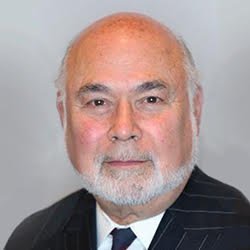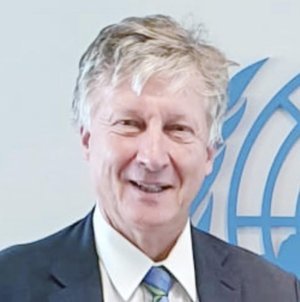Educational Program: Addressing the Massive Global Impact of Corruption

While corruption makes daily headlines around the world, little is written about the commitment of the 189 countries that have signed the UN Convention Against Corruption, a legally binding treaty. Trillions of dollars are being bled from legitimate economies of the world through elicit transactions, tax evasion, bribery and theft. These practices corrupt individuals, societies and governments and put the brakes on social upliftment projects and infrastructure developments thereby robbing us all.
Jonathan Granoff, the Permanent Observer of the International Anti-Corruption Academy (IACA) at the United Nations and President of the Global Security Institute, and Thomas Stelzer, a former Austrian diplomat who serves as the Dean of the International Anti-Corruption Academy IACA, addressed the importance of this global phenomenon that affects the daily lives of everyone—from local communities to international geopolitics. How do we begin to remedy the situation? How do we recapture massive stolen assets and make them available to serve real human needs?
At the end of the Cold War, the world expected the so called Peace Dividend, where budgets for defense spending were assumed to become partially redirected to social programs. It was never delivered. This discussion examines how an effective fight against corruption can deliver The Integrity Dividend.
This educational program was held on Thursday, June 1 and was moderated by Patrícia Vasconcellos, the U.S. correspondent for the Brazilian news network SBT and a board member of the Club of the Association of Foreign Press Correspondents (AFPC-USA Club).
The AFPC-USA is solely responsible for the content of this educational program. Below, readers will find a summary of some of the most important takeaways from the presentation.
ON THE UNITED NATIONS CONVENTION AGAINST CORRUPTION
According to Stelzer, the Convention was a response to “people starting to “accept corruption as a feature of their daily lives” and is an “instrument that gives us the basis to fight corruption globally on the basis of the rule of law efficiently excluding impunity if implemented.” He refers to corruption as “the abuse of authority for personal gains” and notes that corruption was criminalized “by introducing the provisions of the convention in all the countries.”
He notes: “Most countries of the world have ratified this convention, translating the norms, the provisions of the convention into national legislation. National legislative bodies, parliaments, have introduced this convention in national law. Countries have committed to implement this convention to fight corruption, and they have mandated executive branches, their governments, to implement the laws.”
Addressing the impact of the Convention, he notes that IACA tackles the “gap in some countries between the law and implementation” by providing “technical assistance and capacity billing to practitioners, lawyers, judges, prosecutors, traditional personnel, academics, to learn to understand the complex provisions of the Convention better, and to translate this law into their daily life, into their professions, and into government policies.”
Granoff says the Convention “is founded on the concept of good governance,” which “applies to all existential threats humanity faces.” Because we live in a “very integrated world,” corruption has the potential to affect the entire system. He points out that at least between 10 -14 trillion dollars has been denied to the people of the world as a result of corruption and that efforts to address corruption do in part involve “seizing” these “integrity dividends” to bring “accountability, the rule of law, and transparency” to governments, the business community, and the financial community. He says journalists have been instrumental in these efforts. These are the funds needed to fulfill the Sustainable Development Goals and effectively address poverty, climate, and the entire human security agenda the world needs.
ON IACA AND HOW IT BENEFITS SOCIETY
Stelzer says IACA’s mandate is, at its core, to “facilitate implementation of the Convention.” He adds: “We have a legal instrument, global legal instrument, to fight corruption in each one of the 189 countries [that have ratified the Convention] if the norms of the Convention are implemented.” Moreover, a global approach means that “fighting corruption is no longer individualistic.” Fighting corruption has become a societal and economic imperative.
Corruption, he notes, undermines politics, social safety nets, and access to things like the law, clean water, education, and pension benefits. “Access to transparency and information” are crucial to address corruption,” he adds. Transparency “forces decision-makers” to be transparent and accountable about their actions.
IACA, located in Vienna, Austria, focuses on corruption and anti-compliance education and offers academic degrees and training to further its aims and “prepare future diplomats for debates about corruption.” Programs are varied—there are even Spanish programs to benefit those anti-corruption specialists from Spanish-speaking countries—and IACA has trained “thousands of civil servants.”
There are also “a huge number of programs” to benefit journalists who can benefit by “learning to understand corruption” and increase transparency and access to information “as the preconditions to get a better understanding and a better infrastructure of that corruption.”
ON FRAMING ISSUES TO ADDRESS CORRUPTION
Granoff observes that the most successful economies “are the ones in which the citizenry has confidence that their votes and their engagement in civic affairs has results that benefit them.” By contrast, the most “degraded” economies are ones in which there exists “a breakdown of that relationship.” It is imperative that journalists address “the relationship between governance and corruption.” He observes: “When governance is controlled by bribery, when the leaders of states steal from the public treasury, the people lose confidence in governance. When governance is weakened, civil strife is amplified. When civil strife is amplified, economies fail.”
Also crucial for journalists: Mainstreaming the reasons corruption exists. He adds: “Mainstreaming corruption, and its effects… needs to be highlighted in reportage.”
Stelzer emphasizes the importance of providing “hard facts to strengthen narratives.” Currently, he and his team are trying to “find gaps in research” to fulfill one of the Convention’s major tenets, which is asset recovery.
Granoff points out that “no community can exist without building trust and accountability in its leaders today” and that global issues require cooperation. Corruption limits cooperation, and there is no way other than cooperation to address the climate crisis. Corruption impacts humanity’s ability to meet the UN’s Sustainable Development Goals (SDGs). Anti-corruption efforts “strengthen the social fabric and the legal fabric to address every one of them.”
As an example, he goes on to add that corruption can limit confidence in markets and that there is technology using AI to help identify illicit financial flows. NASDAQ has created this. However, there exists a gap between the opportunity “to identify illicit transactions and prevent them” and the willingness to “enforce and prosecute them.” Capacity-building is needed to create “a culture of cooperation to address corruption” and it starts with “public awareness.”
ON WHETHER CORRUPTION IS A GREATER RISK IN COUNTRIES WHERE NUCLEAR INSECURITY IS A REALITY
Stelzer observes that countries cannot be “extracted” either from nuclear threats or corruption and that there isn’t “much direct research on the effects of corruption on nuclear security.” However, corruption always “undermines structures, trust, and accountability,” which could, in theory, affect nuclear security, but it is still an assumption. He stresses the need for more substantial research into this topic.
ON WHY PEOPLE MIGHT LEAVE THEIR HOME COUNTRIES IN SEARCH OF A BETTER LIFE ELSEWHERE
“Access to opportunities, billing, better legal systems, better justice systems, more equitability,” are just some of the reasons, according to Stelzer, who notes that “building more fair, more law based, more accountable systems, rule of law, access to justice, human rights, sustainable development” is integral to anti-corruption efforts.
Granoff uses the example of U.S. concerns of migrants crossing the southern border: Most of these migrants are coming from “Honduras, Guatemala, El Salvador, Nicaragua, [and] Mexico,” countries that are considerably corrupt. By contrast, there isn’t an influx of migrants from Costa Rica, a country that enjoys “the greatest freedom of the press, the highest level of social services and education, the best healthcare system in the region, and the least violation of human rights and a rule of law that is relied upon by the population, and even in their interactions with other countries.” The difference, he says, is corruption in the former nations and good governance in the latter nation. Corruption creates conditions for “social disruption, poverty, suffering, tremendous suffering.”


